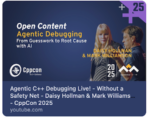I wrote last year about a company called Bronco, offering an agentic approach to one of the hottest areas in verification – root-cause debug. I find Bronco especially interesting because their approach to agentic is different than most. Still based on LLMs of course but emphasizing playbooks of DV wisdom for knowledge capture … Read More
Tag: bernard murphy
Watch Live Agentic Software Debug
Many moons ago in the Innovation series we explored techniques like spectrum analysis to root-cause bugs. While these methods provide some value they don’t get as close as we would like to isolating a root-cause. In hindsight given what we know about the complexity of conventional debug it is unsurprising that we can’t root-cause… Read More
2025 Retrospective. Innovation in Verification
As usual in January we start with a look back at the papers we reviewed last year. Paul Cunningham (GM, Verification at Cadence), Raúl Camposano (Silicon Catalyst, entrepreneur, former Synopsys CTO and lecturer at Stanford, EE292A) and I continue our series on research ideas. As always, feedback welcome.
Looking back at 2025
… Read MoreAgentic at the Edge in Automotive and Industry
It might seem from popular debate around AI and agentic that everything in this field is purely digital, initiated through text or voice prompts, often cloud-based or on-prem. But that view misses so much. AI is already an everyday experience at the edge, for voice-based control, in object detection and safety-triggered braking… Read More
PQShield on Preparing for Q-Day
Following my series on quantum computing (QC), it is timely to look again at what is still the most prominent real-world concern around this technology: its ability to hack classical security methods for encryption and related tasks. Given what I have written on the topic, an understandable counter would be that QC is still in development… Read More
Curbing Soaring Power Demand Through Foundation IP
Power has become a very hot (ha-ha) topic. The media has latched onto the emergence of massive AI datacenters disrupting energy pricing for consumers. Both as consumers and in industry we welcome faster and better features in our hand-held computing devices, cars, homes, industrial processes and businesses. But without further… Read More
Where is Quantum Error Correction Headed Next?
I have written earlier in this series that quantum error correction (QEC), a concept parallel to ECC in classical computing, is a gating factor for production quantum computing (QC). Errors in QC accumulate much faster than in classical systems, requiring QEC methods that can fix errors fast enough to permit production applications.… Read More
Verifying RISC-V Platforms for Space
Space applications are booming, prompted by rapidly declining launch costs now attainable through commercial competition. Thanks to ventures like SpaceX, the cost to put a satellite into low earth orbit (LEO) has dropped from $20k/kg to $2k/kg today and is expected to drop further to $200/kg or lower. Plummeting costs drive … Read More
Automotive Digital Twins Out of The Box and Real Time with PAVE360
Digital twins are amazing technology, virtual representations mirroring a real physical system. Twin virtual models span software, electrical/electronic and mechanical subsystems, closing the loop with feedback from real physical counterparts. The virtual model calibrates against real sensing feedback gathered in … Read More
Quantum Computers: Are We There Yet?
R&D for any fundamentally new technology takes time, especially for hardware; over 10 years passed from the first transistor to the first (very small) integrated circuit. The engineering behind quantum computers is arguably even more challenging than for electronic circuits, at least from today’s perspective. We shouldn’t… Read More











